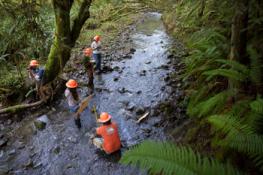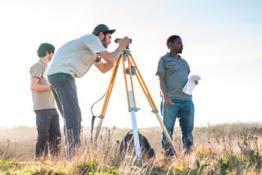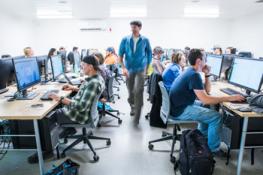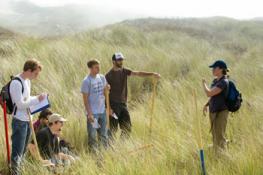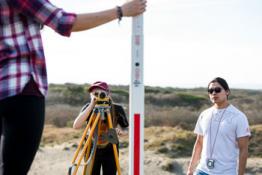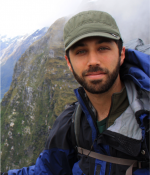Kevin Fingerman, Ph.D.
Professor - Energy & Climate
What I find most exciting about my teaching and research in energy and environmental issues, is the inherently interdisciplinary nature of the challenges we confront. My goal is to arm my students with the methods, tools, and perspectives to understand, and ultimately to influence society’s many technical, economic, and policy choices concerning energy and the natural environment. In my Energy, Technology, and Society course, we take a “tour” through a broad array of conventional and renewable energy technologies, investigating the economic and policy drivers for their use, as well as their varying implications for environmental sustainability, international development, and ethnic/gender/economic equity.
My research is driven by an interest in the broad-based environmental and social impacts of energy technologies and policies. This work seeks to make explicit the trade-offs that are often present between energy systems, climate, and other important social and environmental objectives. In particular, I have worked on issues at the water/energy nexus, evaluating the “water footprints” of a range of energy technologies. In addition, I have worked on the climate, health, and policy implications of using waste streams – from woody residues of forest thinning to landfill gas and manure – as a renewable resource. My research has employed life cycle assessment (LCA), geospatial modeling, and technoeconomic analysis to inform policies at the state and federal level as well as internationally.
I approach my research with an eye toward implementation. This has led me to work with California regulatory agencies on fuel and forest policy formulation and to serve on the board of directors of the Geneva-based Roundtable on Sustainable Biomaterials. Prior to coming to Humboldt, I worked in Rome for the United Nations Food and Agriculture Organization. While there, I provided support to the governments of Indonesia and Colombia in evaluating the environmental and social impacts of their biofuel industries, and in formulating policies to address those impacts.
Specialty Area
Research Interest Areas:
- Water/Energy Nexus
- Bioenergy
- Life Cycle Assessment (LCA)
Education
Courses Taught
Research
My research is driven by an interest in the broad-based environmental and social impacts of energy technologies and policies. In particular, I have worked on the water/energy nexus, bioenergy, waste diversion, and transportation energy systems.
Publications
Younes, A., Fingerman, K., Barrientos, C., Carman, J., Johnson, K., and Wallach, E. (2021). How the Renewable Fuel Standard can use garbage to pay for electric vehicles. Energy Policy. In review
Fingerman, K and Carman, J (2021). Climate impacts of biopower generation from forest residues in California. California Energy Commission. Sacramento
Hsu, C. W.,& Fingerman, K. (2021). Public electric vehicle charger access disparities across race and income in California. Transport Policy, 100, 59-67
Sanchez, D. L.,Fingerman, K., Herbert, C., & Uden, S. (2021). Policy Options for Deep Decarbonization and Wood Utilization in California's Low Carbon Fuel Standard. Frontiers in Climate, 3, 40.
Fingerman, K, and Anderson, D. (2019). Moving Beyond Incineration Putting residues from California forest management and restoration to good use. Sierra Club of California. San Francisco
Fingerman, K, C Sheppard, & A Harris. (2018). California’s Low Carbon Fuel Standard: Modeling financial least-cost pathways to compliance in Northwest California. Transportation Research Part D: Transport and Environment, 63, 320-332
Fingerman, K, Iriarte, L., Fritsche, U., Nabuurs, G. J., Staritsky, I., Mai-Moulin, T., Visser, L., & Junginger, M. (2017) “Opportunities and risks for sustainable biomass export from the US Southeast to Europe.” Biofuels, Bioproducts, and Biorefining. doi:10.1002/bbb.1845
Fingerman, K and J Gwynn (2015). “The water-biofuel-poverty nexus: Investigating the water resource impacts of biofuel expansion and the resulting links to poverty in susceptible regions.” ActionAid. Washington, DC.
UN Food and Agriculture Organization. (2014). Pilot Testing of GBEP Indicators for Sustainability in Colombia and Indonesia. UNFAO. Rome, Italy. (co-PI/Lead Technical Officer for UN study and authorless publication)
Kammen, DM, S Borgeson, and K Fingerman. (2011). “Correcting faulty math on renewable energy.” Grist.org & National Geographic Great Energy Challenge.
Fingerman, K, G Berndes, S Orr, BD Richter, and P Vugteveen. (2011). “Impact assessment at the bioenergy/water nexus.” Biofuels, Bioproducts, and Biorefining, 5(4):375-386
McKone T, W Nazaroff W, P Berck, M Auffhammer, T Lipman, MS Torn, E Masanet, A Lobscheid, N Santero, U Mishra A Barrett, M Bomberg, K Fingerman, C Scown, B Strogen, and A Horvath. (2011). “Grand Challenges for Life-Cycle Assessment of Biofuels.” Environmental Science & Technology 45(5): 1751–1756.
Fingerman, K, M Torn, D Kammen, M O’Hare. (2010). “Accounting for the water impacts of ethanol production.” Environmental Research Letters, 5:014020

